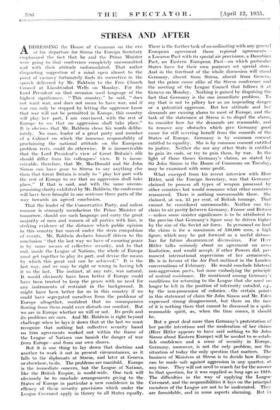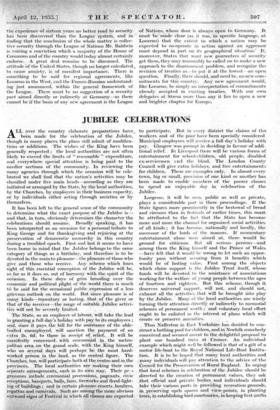STRESA AND AFTER
ADDRESSING the House of Commons on the eve of his departure for Stresa the Foreign Secretary emphasized the fact that he and the Prime Minister were going to that conference completely uncommitted and with their attitude unformulated. That rather disquieting suggestion of a mind open almost to the point of vacancy fortunately finds its corrective in the speech delivered by Mr. Baldwin to the Free Church -Council at Ilandrindod Wells on Monday. For the Lord President on that occasion used language of the highest significance. " This country," he said, " does not want war, and does not mean to have war, and if war can only be stopped by letting the aggressor know that war will not be permitted in Europe, this country will play her part, I am convinced, with the rest of Europe to sec that no aggression shall take place." It is obvious that Mr. Baldwin chose his words delibe- rately. No man, leader of a great party and member of a Cabinet on which the immense responsibility of proclaiming the national attitude on the European problem rests, could do otherwise. It is inconceivable that the Lord President's view of Great Britain's role should differ from his colleagues' view. It is incon- ceivable, therefore, that Mr. MacDonald and Sir John Simon can have gone to Stresa to say anything else than that Great Britain is ready to " play her part with -the rest of Europe to see that no aggression shall take place." If that is said, and with the same uncom- promising clarity exhibited by Mr. Baldwin, the conference Aral have been brought in one sentence three parts of the way towards an agreed conclusion.
That the leader of the Conservative Party, and unless rumour is strangely mendacious the Prime Minister of tomorrow, should use such language and carry the great majority of men and women of all parties with him, is striking evidence of the distance which public opinion in this country has moved under the stern compulsion of events. Mr. Baldwin declares himself driven to the conclusion "that the last way we have of ensuring peace is by some means of collective security, and to that end, inside the League of Nations, the whole ofEurope must get together to play its part, and devise the means by which this great end can be achieved." It is the last way, and we may be right or wrong in having left it to the last. The instinct, at any rate, was natural. It would obviously have been better if Europe could have been trusted to keep the peace with no need for any instruments of restraint in the background. It might have been better for us in this country if we 'could have segregated ourselves from the problems of Europe altogether, confident that no consequences flowing from them could ever disturb our comfort. But We are in Europe whether we will or not.- Its perils and its problems are ours. And Mr. Baldwin is right beyond challenge when he lays it down that at the last we must recognize that nothing but collective security based on firm agreements worked out within the frame of the League of Nations can banish the danger of war from Europe—and from our own shores.
But it is one thing to lay down that doctrine and another to work it out in present circumstances, as it falls to the diplomats at Stresa, and later at Geneva or elsewhere, to do. The problems are manifold. Europe is the immediate concern, but the League of Nations, like the British Empire, is world-wide. One task will obviously be to conclude arrangements giving to the States of Europe in particular a new confidence in the efficacy of those security provisions which under the .League Covenant apply in theory to all States equally. There is the further task of co-ordinating with any general European agreement those regional agreements— a Locarno Pact with its special air provisions, a Danubian Pact, an Eastern European Pact—on which particular States have for their own purposes set special store. And in the forefront of the whole discussion will stand Germany, absent from Stresa, absent from Geneva, but the prime cause alike of the Stresa conference and the meeting of the League Council that follows it at Geneva on Monday. Nothing is gained by disguising the fact that Germany is the one immediate problem. To say that is not to pillory her as an impending danger or a potential aggressor. But her attitude and her demands are causing alarm to most of Europe, and the task of the statesmen at Stresa is to dispel the alarm, to consider how far the demands are reasonable, and to remove any obstacles which give Germany good cause for still severing herself from the councils of the States of Europe. Germany is by common consent entitled to equality. She is by common consent entitled to justice. Neither she nor any other State is entitled to gain its ends, or try to gain them, by war. In the light of those theses Germany's claims, as stated by Sir John Simon in the House of Conunons on Tuesday, may be examined with some profit.
What emerged from his recent interview with Herr Hitler, said the Foreign Secretary, was that Germany claimed to possess all types of weapon possessed by other countries but would renounce what other countries renounced. There is nothing unreasonable there. She claimed, at sea, 35 per cent. of British tonnage. That cannot be considered unreasonable. Neither can the claim to air parity between Germany, France and Britain —unless sonic sinister significance is to be attributed to the proviso that Germany's figure may be driven higher by the size of the Soviet air force. In personnel on land the claim is for a maximum of 550,000 men, a high figure, which may be put forward as a useful datum- line for future disarmament discussions. For Herr Hitler talks seriously about an agreement on arms limitation, and would accept, if other Powers did, per- manent international supervision of her armaments. He is in favour of the Air Pact outlined in the London conversations of February. He would conclude bilateral non-aggression pacts, but none embodying the principle of mutual assistance. He mentioned among Germany's conditions for returning to the League that she must no longer be left in the position of inferiority entailed, e.g., by the nonpossession of colonies. • On certain points in this statement of claim Sir John Simon and Mr. Eden expressed strong disagreement, but there on the face of it is nothing there that cannot be discussed in a quite reasonable spirit, as, when the time comes, it 'should be.
But a great deal more than Germany's protestation of her pacific intentions and the moderation of her claims (Herr Hitler appearS to have said nothing to Sir John 'Simon about. Eastern Europe) will be needed to re-estab- lish confidence and a sense of 'security in Europe. Germany, moreover, is not the Only problem, nor the situation of today the only question that matters. The business of Ministers at Stresa is to decide how Europe can be made safe against aggression in any quarter, at any time. • They will not need to search far for the answer to that question, for it was supplied as long ago as 1919. The difficulties in the way of applying the League Covenant, and the responsibilities it lays on the principal members of the League are not to be underrated. They are formidable; and in some aspects alarming. But in the experience of sixteen years no better road to security has been discovered than the League system, and in finding that the conclusion of the whole matter is collec- tive security through the League of Nations Mr. Baldwin is voicing a conviction which a majority of the House of Commons and of the country would today almost certainly endorse. - A great deal remains to be discussed. The attitude.of the United States, though no longer calculated. to cause anxiety, is of manifest importance. There is something to be • said for regional agreements, like Locarno in the West, and the Franco-Russian understand- ing just announced, within the general- framework of the League. .There must be no suggestion of a security pact aimed directly or indirectly at Germany—as there cannot be if the basis of any new agreement is the League of Nations, whose door is always open to Germany. It must be made clear (as it was, in specific language, at Locarno) that the extent to which a nation may be expected to co-operate in action against - an aggressor must depend in part on its geographical situation:. If, moreover, States that want new guarantees of security get them, they may reasonably be called on to make a new approach to the disarmament problem, and recognize the revision of treaties as—to put it at the lowest—an open question. Finally, there should, and need be, no new com- mitments for this country. Any new agreement would, like Locarno, be simply an interpretation of commitments - already accepted in existing treaties. With our own delegates at Stress more than any it lies to open a new and brighter chapter for Europe.



















































 Previous page
Previous page